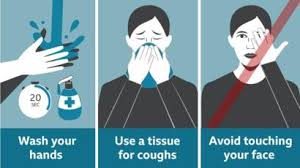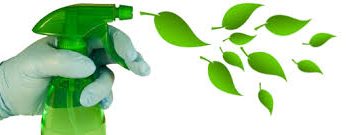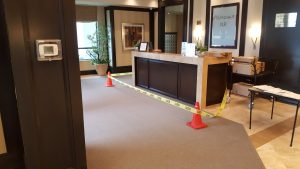 April 2020
April 2020
Coronavirus, also known as Covid-19, Is not the first virus communities have had to deal with. Severe Acute Respiratory Syndrome (SARS), February to June 2003, is an earlier version of today’s coronavirus. A majority of cases occurred among those between 18 and 64 years of age with infection primarily limited to health care workers, patients, and visitors to patients in hospitals. The disease was and is driven by exposure to infected individuals. Transmission occurred primarily within health care settings or in circumstances with close contact. In Canada, there were 438 probable and suspect SARS cases reported, which included 44 deaths.
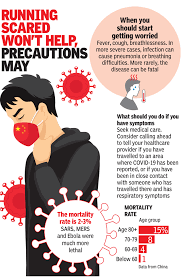 Coronavirus differs in that it is more easily passed to others. Many of those affected don’t exhibit symptoms yet serve as carriers infecting others. The virus survives longer outside of a host. Older and younger people are more likely to have problems along with those having underlying medical conditions such as cardiovascular disease, diabetes, chronic respiratory disease and hypertension.
Coronavirus differs in that it is more easily passed to others. Many of those affected don’t exhibit symptoms yet serve as carriers infecting others. The virus survives longer outside of a host. Older and younger people are more likely to have problems along with those having underlying medical conditions such as cardiovascular disease, diabetes, chronic respiratory disease and hypertension.
Coronavirus has symptoms similar to a cold and the flu. Most common symptoms are fever, cough and difficulty breathing. Symptoms can take up to 14 days to appear after exposure to the virus. Virus transmission occurs when you cough or sneeze; close personal contact such as touching or shaking hands; and touching something with the virus on it, then not washing hands before touching your eyes, nose or mouth.
Communities can take actions to reduce the likelihood of transmission and infection among residents.
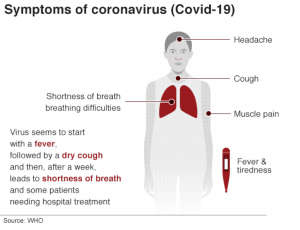
Cleanliness is Paramount
Maintaining a clean and sanitized building will help reduce the spread of coronavirus. Quality cleaning staff properly maintaining your building before the current crisis may need to make minor modifications to their procedures and supplies. CMC Services and Professional Choice Cleaning Services offer advice on how to minimize the risk of virus transmission.
1. More frequent cleaning of touch points; areas in common areas most frequently handled or touched:
- Door handles, elevator buttons, light switches, door opening buttons and push plates, buzzer systems, and hand rails
- Washroom toilets, faucets and sinks
- Exercise equipment
- Office, concierge and common area workstations, desks, phones, keyboards and computer mice
- Smartphones and other communication devices
These areas should be cleaned and sanitized at least daily. Several times a day is preferable. Avoid spreading germs by ensuring all spaces including hallways are cleaned regularly. Provide cleaning supplies so residents and employees can clean personal use spaces such as seating and exercise equipment on their own.
2. Cleaning staff should utilize hospital grade disinfecting wipes and cleansers.
3. Maintain a two-month supply of cleaning supplies to avoid shortages.
4. Use microfibre cloth and disinfecting cleanser. These are more effective than cotton cloth.
5. Ensure hand soap and sanitizer dispensers remain filled. Purchase and install additional wall mounted or free-standing hand sanitizer stations throughout common areas.
Communications
Limit communications to providing building-specific information. Electronic communication works best. Those communities currently using condo avoid risk of virus transmission via paper. Communications are simplified, faster and include a central area for electronic posting of information.
In communications, remind of the importance of handwashing. Direct residents to rely on information provided by official sources which include:
Frequent notices providing limited information suggest disorganized or unprepared management. A single comprehensive notice to residents offers a single source for information. Condo Directors Group, an Ottawa-based organization, offers a Word template which can be customized for any community at www.condodirectorsgroup.com .
Residents are part of the solution
Everyone can and should take actions to prevent the spread of coronavirus:
- Wash your hands often with warm water and soap or an alcohol-based hand sanitizer
- Avoid contact with people known to be sick
- If sick, remain at home
- When sneezing or coughing do so into your sleeve
- Avoid touching your eyes, nose and mouth
Some communities have chosen to temporarily close access to amenities or disallow use of guest suites. Others have chosen to provide spaces, including exercise rooms, with appropriate cleaning and disinfecting supplies for residents to utilize before and after use.
Physical Distancing
In an effort to slow down transmission of coronavirus, and avoid overloading of emergency health services, authorities have closed down most activities. Physically separating people is a method to minimize contagion. Some communities choosing to emulate this approach have taken actions that include:
- Closure of all amenities
- Discouragement of public gatherings in lobby or by the concierge desk
- Limiting resident access to concierge/security, superintendent, and management office to e-mail and phone only
- Requiring deliveries, including newspapers and food, to be left at the main desk for resident retrieval
- Discouraging guest visitations
- Closure of common area bathrooms except for use by on-site vendors
